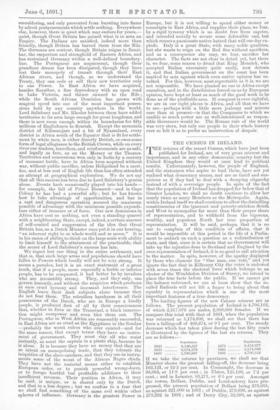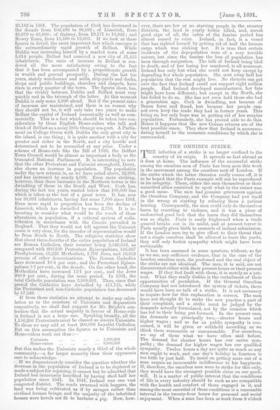THE CENSUS IN IRELAND. T HE returns of the recent Census,
which have just been published for Ireland, are of very great interest and importance, and in any other democratic country but the United Kingdom they would at once lead to political results. Unfortunately, however, the people of England, and the statesmen who aspire to lead them, have not yet realised what democracy means, and are as timid and sus- picious as if they had to deal with a decaying oligarchy instead of with a sovereign people. In spite of the fact that the population of Ireland has dropped far below that of Greater London, we shall no doubt continue to allow her nearly twice as many Members as the Metropolis. Again, within Ireland itself we shall continue to allow the dwindling constituencies of the ignorant and poverty-stricken South and West to monopolise far more than their proper share of representation, and to withhold from the vigorous, wealthy, and populous North her true proportion of representation. It will be said, perhaps, that it is no use to complain of this condition of affairs, that it would be impossible at this period in the life of a Parlia- ment to embark on such a question as a redistribution of seats, and that, since it is certain that no Government will take up the injustice done to Scotland and England by the over-representation of Ireland, it is no good to call attention to the matter. In spite, however, of the apathy displayed by those who clamour for "One man, one vote," and yet ignore the fact that in Kilkenny City the voter is endowed with seven times the electoral force which belongs to an elector of the Wimbledon Division of Surrey, we intend to place the true facts before the public. If we cannot get the balance redressed, we can at least show that the so- called Radicals will not lift a finger to bring about that equality in representation which is one of the most important features of a true democracy. The leading figures of the new Census returns are as follows. The present population of Ireland is 4,706,162, of which 2,317,076 are males, 2,389,086 females. If we compare this total with that of 1881, when the population was returned as 5,174,836, we shall see that there has been a falling-off of 468,674, or 9'1 per cent. The steady decrease which has taken place during the last fifty years is illustrated by the figures of the last six returns. They are as follows :- Population.
1841 8,196,527 1851 6,574,278 1861 5,708,967
If we take the returns by provinces, we shall see that Munster shows the greatest falling-off, the decrease being 162,121, or 12.2 per cent. In Connaught, the decrease is 98,084, or 11.9 per cent. ; in Ulster, 125,198, or 7.2 per cent. ; and in Leinster, 83,271, or 6'5 per cent. Amongst the towns, Belfast, Dublin, and Londonderry have pro- gressed, the present population of Belfast being 273,055, as against 221,600 in 1881; of Dublin, 278,896, as against 273,282 in 1881; and of Derry City, 32,893, as against
Population.
1871 5,412,877 1881 5,174,836 1801 4,706,162
29,162 in 1881. The population of Cork has decreased in the decade from 104,496 to 96,891; of Limerick, from 48,670 to 45,909; of Galway, from 19,171 to 16,942; and Newry Town, from 15,590 to 13,605. If we look at these figures in detail, the most important fact which emerges is the extraordinarily rapid growth of Belfast. While Dublin was increasing herself by a market town of some 5,614 people, Belfast had annexed a new city of 51,455 inhabitants. The ratio of increase in Belfast is ren- dered all the more satisfactory owing to the fact that it has been accompanied by a proportionate growth in wealth and general prosperity. During the last ten years, stately warehouses and mills, ship-yards and docks, shops and public buildings, churches and chapels, have risen in every quarter of the town. The figures show, too, that the rivalry between Dublin and Belfast must very quickly end in the triumph of the latter. At this moment Dublin is only some 5,800 ahead. But if the present rates of increase are maintained, and there is no reason why they should not be, it will only take two years to make Belfast the capital of Ireland numerically as well as com- mercially. This is a fact which should be taken into con- sideration by those English Home-rulers who talk and think of Belfast as a noisy little Orange sea-port. A Parlia- ment on College Green with Dublin the only great city in the island, is one thing ; it is quite another with a city far greater and richer in the North, and a city hostile and determined not to be reconciled at any price. Under a scheme of Home-rule like the Bill of 1886, the Belfast Town Council would be almost as important a body as the truncated National Parliament. It is interesting to note that the other Protestant and Unionist stronghold, Derry, also shows an increase in population. The population under the new returns is, as we have noted above, 32,893, and has increased by nearly 4,000. Even more striking, however, than these increases in the Northern towns is the dwindling of those in the South and West. Cork has, during the last ten years, wasted below that 100,000 line which is taken as the test of a great town. It has now but 96,891 inhabitants, having lost some 7,600 since 1881. Even more rapid in proportion has been the decline of Limerick, which has dwindled by some 2,750. It is in- teresting to consider what would be the result of these alterations in population, if a rational system of redis- tribution in accordance with the Census prevailed in England. That they would not tell against the Unionist cause is very clear, for the transfer of representation would be from South to North. The religious statistics show that about three-fourths of the entire population of Ireland are Roman Catholics, their number being 3,549,956, as compared with 609,230 Protestant .Episcopalians, 446,667 Presbyterians, 55,225 Methodists, 1,798 Jews, and 50,652 persons of other denominations. The Roman Catholics have decreased 10.4 per cent., and the Protestant Episco- palians 5.1 per cent., in the decade. On the other hand, the Methodists have increased 13.1 per cent., and the Jews 280.9 per cent., during the same period. In 1881, the total Catholic population was 3,960,891. Thus, since that period. the Catholics have dwindled by 411,135, while the Protestant and non-Catholic population has decreased by 57,549.
If from these statistics we attempt to make any calcu- lation as to the numbers of Unionists and Separatists respectively, we shall find support for Mr. Bright's con- tention that the actual majority in favour of Home-rule in Ireland is not a large one. Speaking broadly, all the 1,156,206 Protestants must be classed as sincere Unionists. To these we may add at least 200,000 Loyalist Catholics. But on this assumption the figures as to Unionists and Home-rulers work out thus :- Unionists 1,356,200
home-rulers • ,, 3,349,056
But this makes the Unionists nearly a third of the whole community,--a far larger minority than their opponents care to acknowledge. If we dispassionately consider the question whether the decrease in the population of Ireland is to be deplored or made a subject for rejoicing, it cannot but be admitted that Ireland has immensely benefited by having shed half her population since 1841. In 1841, Ireland was one vast congested district. The roads swarmed with beggars, the laud was being cultivated as if by savages rather than civilised human beings, and the majority of the inhabited houses were hovels not fit to harbour a pig. Now, how- ever, there are few or no starving people in the country districts, the land is yearly better tilled, and, surest good sign of all, the cabin of the famine period has almost ceased to exist. Ireland, in fact, is a vessel that has righted herself by getting rid of half the human cargo which was sinking her. It is true that certain incidents of the depopulation were of a very terrible nature, but since the famine the loss of population has been through emigration. The talk of Ireland being bled to death, and of her losing her manhood, is all nonsense. Ireland has only lost what she could not keep except by degrading her whole population. She sent away half her population that the rest might live. No rhetoric can get over the fact that Ireland could not support eight million people. Had Ireland developed manufactures, her fate might have been different; but except in the North, she has failed to do so. She has not even held those she had a generation ago. Cork is dwindling, not because of Saxon force and fraud, but because her people can- not even keep the trade they had in former years. This being so, her only hope was in getting rid of her surplus population. Fortunately, she has proved able to do this. Hence it happens that the new Census returns are of the best possible omen. They show that Ireland is accommo- dating herself to the economic conditions by which she is surrounded.







































 Previous page
Previous page